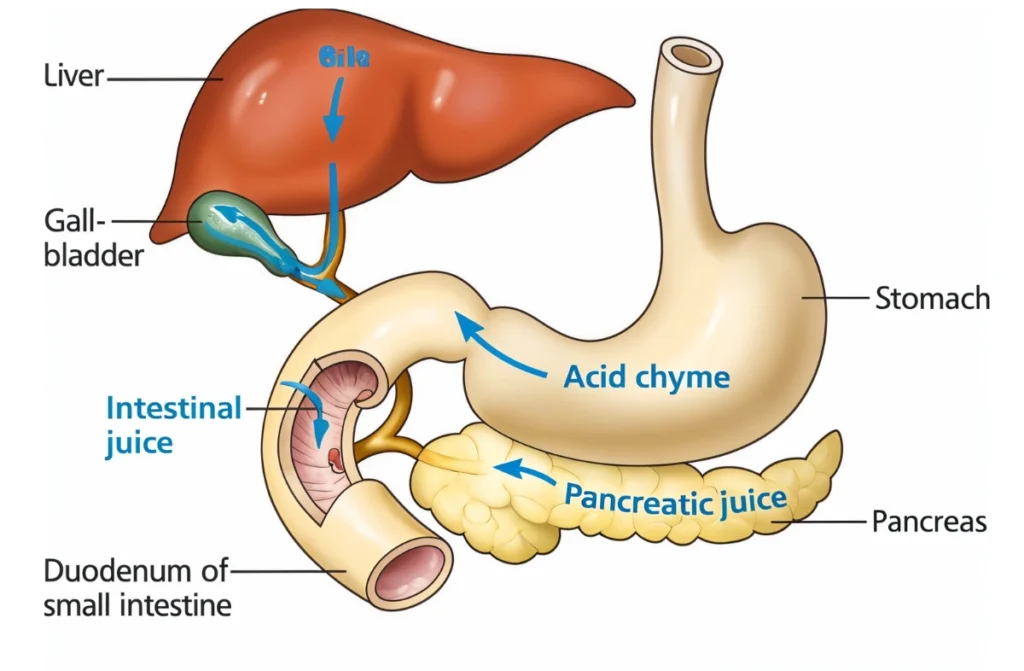The digestive system of the liver is fundamental to the body’s ability to process nutrients and detoxify harmful substances. The liver’s multifaceted roles include bile production, nutrient storage, and metabolism regulation. Understanding the digestive system of liver helps appreciate its vital functions and the importance of maintaining liver health.
What is the Digestive System?
The digestive system is a complex network of organs responsible for breaking down food, absorbing nutrients, and eliminating waste. It includes the mouth, esophagus, stomach, intestines, liver, pancreas, and gallbladder. The use of liver in the digestive system is crucial, as it produces bile to aid fat digestion and metabolizes nutrients for energy.
Each organ in the digestive system has a specific role, ensuring seamless digestion and nutrient absorption. A healthy digestive system is essential for overall well-being, energy levels, and immune defense. Maintaining a balanced diet, staying hydrated, and regular check-ups can support optimal digestive health.

Common Digestive System Disorders
Digestive system disorders are widespread, affecting millions globally. Issues can range from minor discomforts to severe chronic conditions. Common digestive system disorders include acid reflux, irritable bowel syndrome (IBS), constipation, and Crohn’s disease. These conditions can significantly impact daily life if left untreated.
Symptoms of digestive system disorders:
- Persistent abdominal pain or bloating.
- Changes in bowel habits, such as diarrhea or constipation.
- Heartburn or acid reflux.
- Unexplained weight loss or fatigue.
Early diagnosis and treatment are crucial to managing these conditions effectively. The use of liver in the digestive system also highlights its role in filtering toxins and aiding digestion, making liver health vital. Consulting a specialist and adopting a healthy lifestyle can prevent and manage these disorders, improving quality of life.
Liver’s Functions in Digestion
The liver is a large, reddish-brown organ located in the upper right quadrant of the abdomen. It performs several critical functions within the digestive system, such as:
- Producing bile, which aids in the digestion and absorption of fats.
- Metabolizing carbohydrates, proteins, and fats.
- Detoxifying blood by removing toxins and harmful substances.
- Storing essential nutrients, including vitamins and minerals.
The digestive system of liver is integral to maintaining the body’s metabolic balance and ensuring efficient nutrient utilization.
Common Liver Disorders Affecting Digestion
Several liver disorders can impact the digestive system, leading to various symptoms and complications. Some common liver disorders include:
- Hepatitis: Inflammation of the liver caused by viral infections, alcohol abuse, or autoimmune diseases.
- Cirrhosis: Chronic liver damage resulting in scarring and impaired liver function.
- Fatty Liver Disease: Accumulation of fatty in liver cells, often associated with obesity and metabolic syndrome.
- Liver Cancer: Malignant tumors originating in the liver, potentially disrupting liver function and digestion.
Recognizing and addressing these liver disorders is crucial for maintaining a healthy digestive system of liver.
Role of Pancreas and Liver in Digestion
The role of pancreas and liver in digestion is interconnected and essential for optimal digestive health. Both organs produce enzymes and substances necessary for breaking down food and absorbing nutrients.
Pancreas
- Produces digestive enzymes like amylase, lipase, and protease.
- Releases insulin and glucagon to regulate blood sugar levels.
Liver
- Produces bile, which emulsifies fats and enhances fat absorption.
- Metabolizes nutrients and stores glycogen for energy.
- Detoxifies blood by breaking down harmful substances.
Together, the role of pancreas and liver in digestion ensures that the body efficiently processes food and maintains metabolic homeostasis.
Use of Liver in Digestive System
The use of liver in digestive system is multifaceted, with several key functions that support digestion and overall health. These functions include:
- Bile Production: The liver produces bile, which is stored in the gallbladder and released into the small intestine to aid in fat digestion.
- Metabolism Regulation: The liver processes carbohydrates, converting them into glucose for energy or storing them as glycogen.
- Protein Synthesis: The liver produces essential proteins, including albumin and clotting factors.
- Detoxification: The liver filters and detoxifies blood, removing toxins and waste products.
The digestive system of liver plays a crucial role in ensuring that the body can effectively break down food and absorb essential nutrients.
How Does Food Move Through My GI Tract?
The gastrointestinal (GI) tract is a complex system that ensures food moves efficiently through digestion. This process begins in the mouth, where chewing and saliva initiate digestion. The food then travels down the esophagus via peristalsis, a wave-like muscle contraction. Upon reaching the stomach, acids and enzymes break it down further before entering the small intestine.
Key Processes:
- Mouth: Chewing and salivary enzymes start digestion.
- Esophagus: Peristalsis moves food toward the stomach.
- Stomach: Gastric acids further break down food.
- Small Intestine: Nutrients are absorbed into the bloodstream.
- Large Intestine: Waste material is processed and excreted.
The role of pancreas and liver in digestion is crucial at this stage. The liver produces bile, aiding in fat breakdown, while the pancreas secretes digestive enzymes that help in carbohydrate and protein digestion.
How Does My Digestive System Break Food Into Small Parts My Body Can Use?
Breaking down food into absorbable components involves both mechanical and chemical digestion. Mechanical digestion includes chewing and churning in the stomach, whereas chemical digestion involves enzymes and bile that help break down nutrients.
Digestive Breakdown:
- Carbohydrates: Broken down into simple sugars by salivary amylase and pancreatic enzymes.
- Proteins: Digested into amino acids with the help of stomach acid and pancreatic enzymes.
- Fats: Bile from the use of liver in digestive system emulsifies fats, making them easier to digest by pancreatic lipase.
The role of pancreas and liver in digestion ensures that nutrients are efficiently broken down and absorbed into the bloodstream, providing essential energy and growth components to the body.
What Happens to the Digested Food?
Once food is broken down, nutrients are absorbed primarily in the small intestine and transported to various body cells for energy, repair, and growth.
Absorption Process:
- Carbohydrates: Absorbed as glucose into the bloodstream.
- Proteins: Absorbed as amino acids for muscle and tissue repair.
- Fats: Absorbed as fatty acids and glycerol with the help of bile from the liver.
The use of liver in digestive system is significant in nutrient metabolism. It stores excess glucose as glycogen, detoxifies harmful substances, and synthesizes essential proteins.
How Does My Body Control the Digestive Process?
The digestive process is regulated by both the nervous and endocrine systems to ensure food is processed efficiently.
Regulation Mechanisms:
- Nervous System: Controls muscle contractions, peristalsis, and enzyme secretion.
- Endocrine System: Releases hormones like gastrin and secretin to regulate digestive functions.
- Liver and Pancreas Coordination: The role of pancreas and liver in digestion is integral. The pancreas releases insulin and glucagon to maintain blood sugar, while the liver ensures detoxification and nutrient storage.
Common digestive system disorders such as acid reflux, irritable bowel syndrome (IBS), and gallstones can occur if these processes are disrupted. Maintaining a healthy diet and lifestyle is essential to support digestive health.
Liver Health and Its Impact on the Digestive System of Liver
Maintaining liver health is vital for efficient digestion and overall well-being. Several factors can affect liver health, including diet, lifestyle, and medical conditions. To support liver health, consider the following tips:
- Healthy Diet: Consume a balanced diet rich in fruits, vegetables, lean proteins, and whole grains.
- Hydration: Drink plenty of water to help the liver flush out toxins.
- Moderate Alcohol Intake: Limit alcohol consumption to reduce the risk of liver damage.
- Regular Exercise: Engage in regular physical activity to maintain a healthy weight and support liver function.
- Avoid Toxins: Minimize exposure to environmental toxins and avoid smoking.
Understanding the digestive system of liver and implementing these health tips can significantly improve liver function and digestion.
Conclusion
The digestive system of liver is indispensable to the body’s ability to process nutrients and detoxify harmful substances. By understanding the liver’s functions, the role of pancreas and liver in digestion, and the importance of maintaining liver health, we can better appreciate this vital organ’s contributions to our overall well-being. Ensuring liver health through a balanced diet, regular exercise, and avoiding harmful substances can significantly enhance digestive efficiency and metabolic balance.
